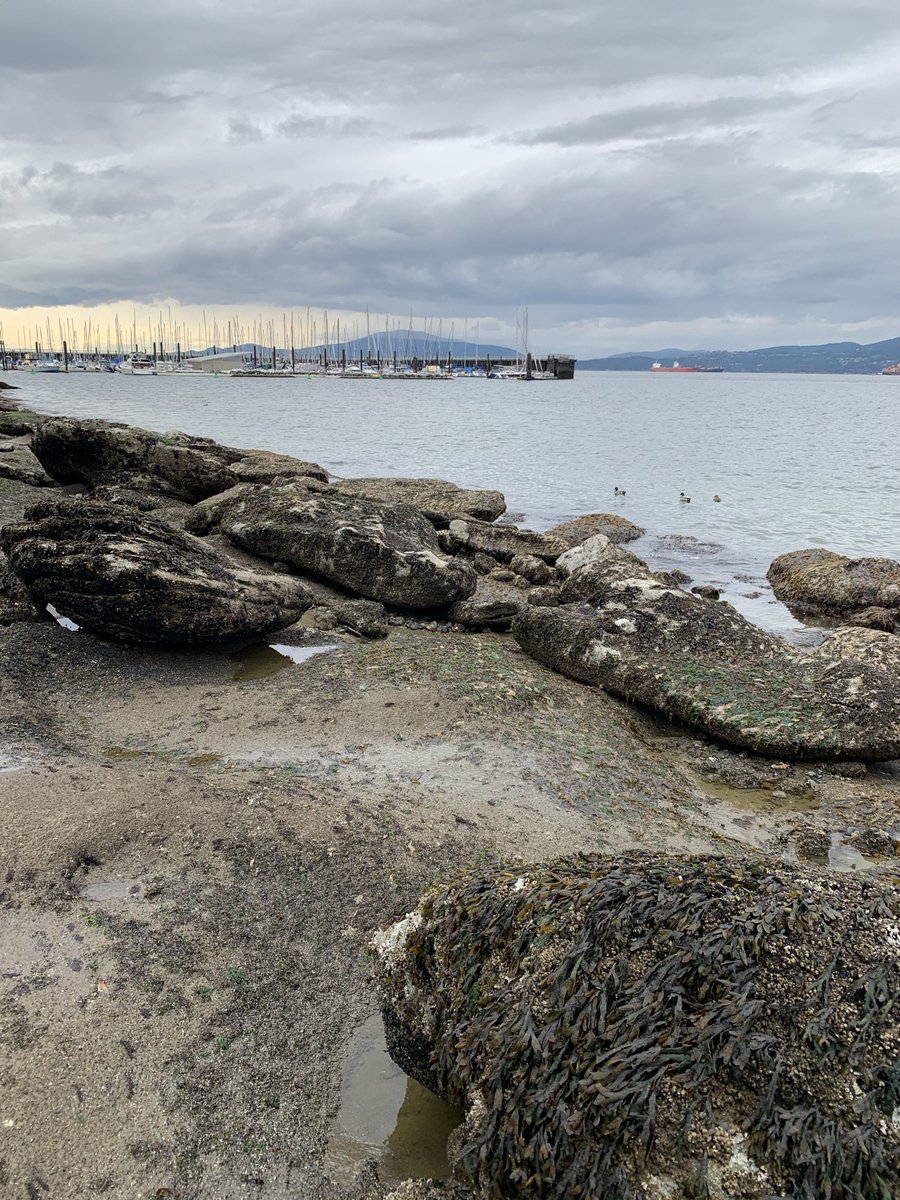1: although we rely heavily on the ocean for its many resources, the ocean is relatively undiscovered  https://abs.twimg.com/emoji/v2/... draggable="false" alt="🌊" title="Wasserwelle" aria-label="Emoji: Wasserwelle"> as only ~ 5% has been explored! #OceanConsvnUBC
https://abs.twimg.com/emoji/v2/... draggable="false" alt="🌊" title="Wasserwelle" aria-label="Emoji: Wasserwelle"> as only ~ 5% has been explored! #OceanConsvnUBC
2: we heavily depend on the ocean for fisheries but 2/3 of stocks are already exploited to the maximum sustainable yield and 1/3 are beyond that limit  https://abs.twimg.com/emoji/v2/... draggable="false" alt="🐟" title="Fisch" aria-label="Emoji: Fisch"> (source: FAO) #OceanConsvnUBC
https://abs.twimg.com/emoji/v2/... draggable="false" alt="🐟" title="Fisch" aria-label="Emoji: Fisch"> (source: FAO) #OceanConsvnUBC
3: so clearly we are impacting the ocean - but what does that look like? we are inputting:  https://abs.twimg.com/emoji/v2/... draggable="false" alt="🚮" title=""Werfen sie Abfälle in die dafür vorgesehenen Behälter"-Zeichen" aria-label="Emoji: "Werfen sie Abfälle in die dafür vorgesehenen Behälter"-Zeichen">garbage, oil, fertilizers, CO2 and increasing outputs of the ocean by overfishing, oil extraction, mining, etc. #OceanConsvnUBC
https://abs.twimg.com/emoji/v2/... draggable="false" alt="🚮" title=""Werfen sie Abfälle in die dafür vorgesehenen Behälter"-Zeichen" aria-label="Emoji: "Werfen sie Abfälle in die dafür vorgesehenen Behälter"-Zeichen">garbage, oil, fertilizers, CO2 and increasing outputs of the ocean by overfishing, oil extraction, mining, etc. #OceanConsvnUBC
4: ocean conservation as well as many other fields, are influenced by the idea of shifting baselines: (coined by Daniel Pauly) in which your reference point will be the earliest baseline you have and will act as your point of comparison for future changes #OceanConsvnUBC
5: we know that many species are being affected by climate change  https://abs.twimg.com/emoji/v2/... draggable="false" alt="☁️" title="Wolke" aria-label="Emoji: Wolke"> and they have four ways in which they respond 1. move 2. acclimate 3. adapt 4. die (known as MAAD) #OceanConsvnUBC
https://abs.twimg.com/emoji/v2/... draggable="false" alt="☁️" title="Wolke" aria-label="Emoji: Wolke"> and they have four ways in which they respond 1. move 2. acclimate 3. adapt 4. die (known as MAAD) #OceanConsvnUBC
6: community engagement is a great way to involve more people in conservation work especially via comanagement strategies  https://abs.twimg.com/emoji/v2/... draggable="false" alt="👥" title="Silhouette von Büsten" aria-label="Emoji: Silhouette von Büsten"> #OceanConsvnUBC
https://abs.twimg.com/emoji/v2/... draggable="false" alt="👥" title="Silhouette von Büsten" aria-label="Emoji: Silhouette von Büsten"> #OceanConsvnUBC
7: recovery of marine systems can mean many things so we have to establish clear metrics for how recovery can be measured!  https://abs.twimg.com/emoji/v2/... draggable="false" alt="🦀" title="Krabbe" aria-label="Emoji: Krabbe"> #OceanConsvnUBC
https://abs.twimg.com/emoji/v2/... draggable="false" alt="🦀" title="Krabbe" aria-label="Emoji: Krabbe"> #OceanConsvnUBC
8: There are many ways to fish, and each has a different impact on marine systems. Active gear: chases fish i.e. bottom trawling while passive gear: waits for fish to swim into the net i.e. longline fishing https://abs.twimg.com/emoji/v2/... draggable="false" alt="🎣" title="Angelrute und Fisch" aria-label="Emoji: Angelrute und Fisch">Passive gear is usually better in terms of conservation! #OceanConsvnUBC
https://abs.twimg.com/emoji/v2/... draggable="false" alt="🎣" title="Angelrute und Fisch" aria-label="Emoji: Angelrute und Fisch">Passive gear is usually better in terms of conservation! #OceanConsvnUBC
9: we need to do our best to learn from fisheries management issues of the past such as the Atlantic Cod Fishery in Atlantic Canada so that people can maintain their livelihoods while simultaneously conserving oceanic resources like Cod!  https://abs.twimg.com/emoji/v2/... draggable="false" alt="🐟" title="Fisch" aria-label="Emoji: Fisch"> #OceanConsvnUBC
https://abs.twimg.com/emoji/v2/... draggable="false" alt="🐟" title="Fisch" aria-label="Emoji: Fisch"> #OceanConsvnUBC
10: conservation is most effective when you try to check (smaller) things off your list as a way to ensure your work is having a clear impact!  https://abs.twimg.com/emoji/v2/... draggable="false" alt="☑️" title="Kästchen mit Häkchen" aria-label="Emoji: Kästchen mit Häkchen"> #OceanConsvnUBC
https://abs.twimg.com/emoji/v2/... draggable="false" alt="☑️" title="Kästchen mit Häkchen" aria-label="Emoji: Kästchen mit Häkchen"> #OceanConsvnUBC
11: I really enjoyed getting to hear from so many wonderful guest speakers from all over the world which showed me how interdisciplinary this field is and how helpful it is to hear about ocean issues from many different perspectives. #OceanConsvnUBC
12: there is still so much for me to learn about conservation issues in Canada (& globally) and how historic events play a role in shaping our current issues #OceanConsvnUBC
13: fisheries  https://abs.twimg.com/emoji/v2/... draggable="false" alt="🎣" title="Angelrute und Fisch" aria-label="Emoji: Angelrute und Fisch"> are the biggest pressure on the ocean since it encompasses issues from pollution, economic issues, livelihood/social issues, dependence on stocks, etc. #OceanConsvnUBC
https://abs.twimg.com/emoji/v2/... draggable="false" alt="🎣" title="Angelrute und Fisch" aria-label="Emoji: Angelrute und Fisch"> are the biggest pressure on the ocean since it encompasses issues from pollution, economic issues, livelihood/social issues, dependence on stocks, etc. #OceanConsvnUBC
14: policy & politics are a big part of conservation! They are essential in framing what organisms and regions will be protected from major pressures. #OceanConsvnUBC
15: it’s important to use your voice to vote for initiatives you support! i’m trying to learn more about how political issues affect ocean policy #OceanConsvnUBC
16: when advocating for ocean issues, it’s important to appeal to people’s hearts and minds! #OceanConsvnUBC
17: we often hear about a lot of negative issues associated with the ocean so it’s always good to remind ourselves there are positive stories and #OceanOptimism  https://abs.twimg.com/emoji/v2/... draggable="false" alt="😊" title="Lächelndes Gesicht mit lächelnden Augen" aria-label="Emoji: Lächelndes Gesicht mit lächelnden Augen"> #OceanConsvnUBC
https://abs.twimg.com/emoji/v2/... draggable="false" alt="😊" title="Lächelndes Gesicht mit lächelnden Augen" aria-label="Emoji: Lächelndes Gesicht mit lächelnden Augen"> #OceanConsvnUBC
18: it’s important to discuss the changes you want to make with the people who will implement the changes and those who will be affected by the changes. #OceanConsvnUBC
19: we should be open minded about what defines knowledge since this helps paint a more well rounded picture of conservation issues #OceanConsvnUBC
20: we should think more about how we communicate science  https://abs.twimg.com/emoji/v2/... draggable="false" alt="🧪" title="Test tube" aria-label="Emoji: Test tube"> by knowing our audience #OceanConsvnUBC
https://abs.twimg.com/emoji/v2/... draggable="false" alt="🧪" title="Test tube" aria-label="Emoji: Test tube"> by knowing our audience #OceanConsvnUBC

 Read on Twitter
Read on Twitter


